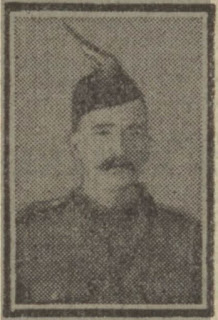The story of Sandy Grieve piping the remnants of the South African infantry out of Delville Wood in July 1916 is well known and easily found on the web. Little is given of his military career before World War 1 except for a few brief lines that he had served in the Anglo-Boer War 1899-1902 and "During the Battle of Magersfontein on the 11th December, 1899, he would
not forget the Boers in a hurry, as he was wounded through both his
cheeks.". This has been picked up an copied by many:
https://jocks.co.za/2022/06/12/pipe-major-alexander-sandy-grieve-d-c-m-and-lament-of-deville-wood/
https://samilhistory.com/2018/11/09/the-black-watch-and-the-delville-wood-lament/
https://theblackwatch.co.uk/blog/soldier-stories/a-pipe-major-delville-wood-and-the-black-watch/
See also: https://www.youtube.com/watch?v=jF-8vdl5QFw
This blog will give more detail on Sandy's earlier military career and correct one error that has been simply repeated.
Alexander "Sandy" Grieve was born about 1869 in Largo, Leven, Fife, Scotland. As an 18 year old blacksmith he enlisted into the Royal Highlanders (Black Watch) on 21st November, 1887 at Cupar. He had also worked as a gamekeeper on the Mounie estate. Completing his training he was posted to the 2nd bn on 18th February, 1888 stationed in the UK. In October 1891 he was appointed a piper and later that year after four years service he opted to complete the mandatory 12 year enlistment with "the colours", and not go onto the Reserve as he would have been entitled to do.
He earned a good conduct badge and extra pay in 1889 and 1893, but lost it in June 1894 for a minor, unrecorded, indiscretion. Between July and August 1894 he was absent for 15 days and when he returned to duty he lost his second good conduct badge and extra pay. He finished 1894 reverting to the rank of Private and he opted to transfer to the Reserve after all. He married and had children.
On the outbreak of war in South Africa he was re-called for active service on 7th October, 1899 and posted back to the 2nd battalion with the rank of Private. The Black Watch, as part of the Highland Brigade were promptly shipped off to South Africa.
The Highland Brigade's first battle was indeed at Magersfontein and we can assume Sandy was there, but, he was not wounded at Magersfontein. Following their mauling at Magersfontein the Highland Brigade did not see action until February 1900 where they helped corral some 4,000 Boer under General Piet Cronje against the Modder River at Paardeberg. They attacked on the 18th February, 1900 crossing the river and enabling troops to get closer to the besieged Boers. It was here at Paardeberg that Grieve was wounded by a bullet that entered the left side of his jaw and exited on the right. Recuperating at hospital he contracted enteric
Sandy was posted back to the Depot in Scotland in June 1900, his war in South Africa was over. He was discharged November 1900 after completing the minimum 12 years service. He was awarded the Queen's South Africa medal with the clasps Cape Colony and Paardeberg. On his return he was feted by his neighbours at Mounie, Oldmeldrum.
Sandy emigrated to South Africa and settled at Heilbron working as a blacksmith. When the 1914 Rebellion broke out Sandy refused to shoe the horses of the rebels and was imprisoned and ordered to be shot. His employer who sympathised with the rebels nonetheless argued for Sandy's release which was achieved in three weeks. Sandy and his two sons volunteered and served in German South-West Africa. At the conclusion of that campaign he volunteered for overseas service.
According to The Pipes of War Sandy was awarded a DCM in 1918.
Sources:
Casualty Roll - The Register
Buchan Observer and East Aberdeenshire Advertiser 17 July 1900
Dundee Evening Telegraph 11 November 1915
Dundee Courier 11 November 1915
WO97 Service papers

No comments:
Post a Comment